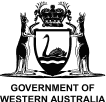Westport has partnered with the Western Australian Marine Science Institution (WAMSI) to deliver the $13.5 million WAMSI-Westport Marine Science Program. This 3-year program is developing the latest data, information and modelling on the complex environmental systems and community values associated with Cockburn Sound.
Project 2.2: Current knowledge of dredging and climate change impacts on seagrass ecosystem.
Research theme: Benthic habitats and community
Researchers: N Said, N Dunham, S Strydom, K McMahon
Publication date: April 2024
Understanding pressures on seagrass health
Seagrass meadows are critical to ocean health.
Many seagrass habitats are under pressure from a number of factors. This report reviewed the current literature and research available to understand what is known about the impacts of ocean warming and dredging activities on temperate seagrass habitats, like those found in Cockburn Sound and south-western Western Australia.
Specific pressures identified for dredging included reduced light quantity and seagrass being buried by sediment. Specific climate change pressures included warmer waters, through gradual warming or marine heatwaves.
As well as a literature review, subject matter experts were interviewed to understand different perspectives on the key pressures, thresholds and bioindicators for seagrass health.
This report is just one within the wider project: Pressure response relationships, building resilience and future proofing seagrass meadows, and will be considered alongside findings from other focus areas in the project.
What the report found
- There are a number of knowledge gaps around the different pressures and the relevant thresholds for seagrass in south-western WA.
- The report recommended a number of further studies to bridge those gaps, covering light thresholds (or minimum amounts of light required for healthy seagrass), impacts of sediment burial and impacts of changing temperatures.
How Westport will use the report
This report will be used in conjunction with the findings from the other seagrass-related research (Theme 2.2.) to provide inputs for Westport’s dredge management planning, including thresholds, monitoring and future research required to support seagrass meadows in Cockburn Sound during the development of the new port.
You can read the full report here.





